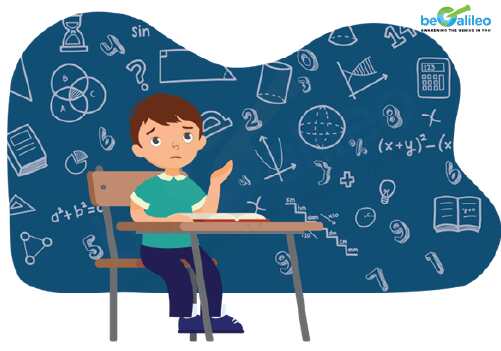Math is one subject which garners very strong emotions among students – either they will love or hate it. There is a known correlation between how maths is perceived by students and how they perform in the subject. Research shows that the dislike for Math grows in early years and tends to get worse as the child goes into higher grades resulting in math phobia. So, we need to address the elephant in the room sooner to be able to address the child’s fear of maths.

Identify the math phobia
Here are 5 signs that will enable you to identify your child’s struggle with mathematics.
Unlock Your Child's Math Potential with beGalileo!

🚀 Transform their math skills with personalized, 1-on-1 classes.
🧮 Experience integrated math and coding for real-world application.
👦 See your child excel—start with a Free Trial Math Class today!
1. Lack of ease with basic arithmetic operations
The first signs of Math anxiety start showing up when the child takes too long to do basic arithmetic operations. In most cases it is not that they lack the knowledge of the procedure but it is their unease with numbers itself. If your child finds it challenging to count numbers individually or in groups of twos, fives, or tens and is lacking behind in comparison to her peers, this might be the beginning of maths phobia.
2. Develops dislike for the subject
As your child struggles in maths, it’s apparent that she may develop a dislike for the subject and eventually grow an aversion to it. You may notice that your child may start giving excuses when you take the math book out but may be happy to work on other subjects.
3. Affects performance in the subject
Your child may be performing better in other subjects but lags in maths. You may hear the class teacher raise concerns on math performance whereas in other subjects the child may be doing well.
4. Time management is a task
Time management is as challenging for kids as it is for adults. Pay attention if your child lacks judgment on increments of time or fumbles upon reading the correct time on the clock.
5. Disassociates maths with real life
Your child finds it difficult to apply mathematical concepts outside the classroom setup. For example, your child has difficulties counting the number of days left for an event or struggles to count currencies and judge the costs of things, etc.
As per a report in India Today from July 2021, 82% of children between grades 7 – 10 are fearful of maths. While there might be many reasons for this, one major issue for your child’s math phobia could be Dyscalculia.
What is Dyscalculia?
Broadly speaking, dyscalculia is a condition where a child may develop learning difficulties with maths. A child may have difficulty grasping many concepts in maths like – before or after, greater than or smaller, even after in-depth explanations. Often termed as number dyslexia, dyscalculia is not the same. Dyslexia is trouble with reading, whereas dyscalculia is trouble with only maths.
Maths Anxiety Vs Dyscalculia
Even-though maths anxiety and dyscalculia may seem to have similar signs, the two are not the same. Maths anxiety stems from a psychological cause where the child having prepared and understood a concept may still doubt her ability to perform. Whereas, dyscalculia may prevent the child from understanding a mathematical concept from the very beginning. Dyscalculia is a condition that is understood as dysfunction of the region around the frontal lobe of the brain and doesn’t necessarily affect cognitive abilities.
Simply put, if your child gets through her homework and classwork fairly better than tests, this can be due to maths anxiety. However, if your child performs poorly in homework, classwork, and in tests, this is due to dyscalculia. Furthermore, one needs to pay attention if the child tries to evade attending maths classes specifically during a test stating they will fail. This can be a cause of dyscalculia. If your child suffers from maths anxiety, they will avoid taking maths classes altogether.

Few reasons for maths fear and math phobia
- Maths phobia is instilled in a child when a parent with maths anxiety unintentionally transfers their fear of maths down to the child while trying to help them do better. This can also occur when they feel pressured to perform in the subject.
- Fear of Maths can develop in children when teachers lacking sufficient skills, try to teach the subject. Another reason could be that the teachers stick to the conventional method of textbook teaching and the child doesn’t get enough real-life examples to learn from.
- Like in most subjects, it’s proven that excessive pressure to perform well in examinations and tests may lead to aversion for the child to that particular subject. This can be true for maths as well. Moreover, the fear of embarrassment of failing or not doing well is a strong reason for maths phobia.
- Strong criticism of the child when she is unable to answer correctly or isn’t able to understand a concept will inhibit the child from expressing her problems, causing maths phobia.
How do kids struggle with maths?
Research journal published by the Frontier media group states that children as young as 6 years of age struggle with mathematical concepts. It clearly states that there is a correlation between ‘maths anxiety and ‘mathematical ability’ that develops at a young age. The article also confirms that a child’s behaviour, emotion, and performance are affected by the opinion of other people.
Another research article published in the National Library of Medicine states that maths anxiety in parents can lead to the same in children. It also states that the parent’s involvement in helping the children with their homework impacts how the child performs in the subject. It is evident from the research that young minds can develop maths anxiety, regardless of what grade they are in. External circumstances like the reaction of parents, teachers, fear, etc. instil maths anxiety in a child.
Tips to overcome maths anxiety
- Use of different teaching aids to clear maths concepts such as the use of flashcards, use of interactive media, etc.
- Encouragement and positive reinforcement can go a long way in helping the child develop mathematical skills. Rewards for better performance can help the child think positively about the subject.
- Identify problem areas and difficult mathematical concepts early on so that these don’t turn into fear in the longer run.
- Unhealthy comparisons of a child with her/his peers in the subject should be avoided. Each child is different and will get there eventually.
- Encouraging questioning skills for a clear understanding is more important rather than memorising.
Online math classes for kids with beGalileo has helped them to build confidence, improve problem solving skills and boost critical thinking. This eventually results in eradicating the math phobia for the child. Contact us to know how we have used the above mentioned tips to help the child overcome maths anxiety.
